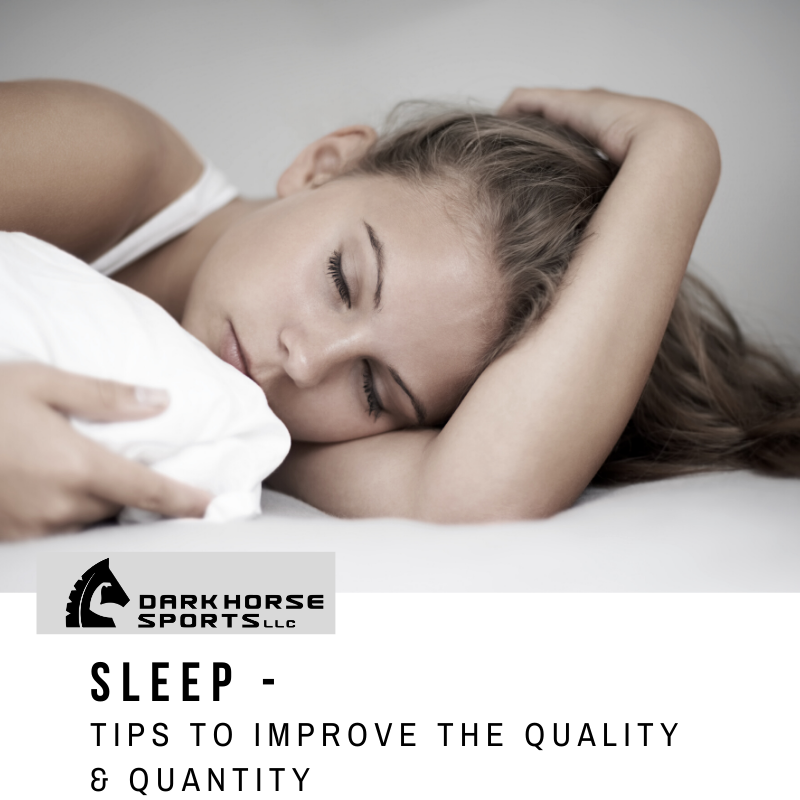|
Let's get you sleeping better, deeper, and longer with these helpful tips. “Sleep is the golden chain that ties health and our bodies together.” — Thomas Dekker, American Actor Thomas Dekker was right. Sleep is the number 1 thing you can do to improve everything. Your body, mind, relationships, work… you name it, sleep can fix it, or at least make it better. That’s why when we onboard a new athlete or client, sleep is the first thing we try to improve. So we want to share with you some tips and ideas that will help improve your sleep quantity and quality. (If you are too tired you can read the cliff notes at the end). Temperature: Think Batcave. Cool and dark (more on this later). Your body temperature decreases to initiate sleep, so a cool room gives it a head start. How cold? Somewhere around 60-68 degrees Fahrenheit. You can always wear less or more clothes to bed to figure out what works best for you. Sound: This one may seem obvious. Loud noises will not allow you to fall asleep. However, a low, constant sound in the background may actually help. So experiment with some “white noise” if you're bothered by outside noise, try leaving a fan or humidifier on in your bedroom. This will create a steady hum that will drown out or level out distracting sounds, such as city traffic or nocturnal animals rustling around. Or you can always use earplugs. Light: Remember that old Simon & Garfunkel song “Hello darkness my old friend...”? Well it's true! Darkness is your best sleepover friend. Darkness is so important that just covering up your eyes isn't enough. Did you know that your skin is actually a very large light receptor? That means you need to have your bedroom Pitch Black. Get good drapes or blinds, block out ambient light, and cover any light sources. Just have a flashlight near buy in case you do need to get up and move quickly. If darkness is your friend then light is your…? Enemy? Not exactly. Some light is actually great for sleeping. Especially early morning sunlight between 6AM - 8AM. It can restore your natural circadian rhythm. What is your enemy? Blue light from screens and devices however are not good at all. They can rob you of sleep and you won't even know it. See, artificial blue light may not stop you from falling asleep, but it affects the quality of sleep you get by delaying and minimizing your deep REM sleep. For more info on blue light, go HERE. So either create a device curfew around sunset, or if you are not a monk, invest in a quality pair of blue light blocking glasses that actually work. We recommend using:
Food: Ever go to bed stuffed? How did you feel? Chances are, you didn't sleep all that well. At night, when we sleep our body gets to repair itself. So at night if we have a ton of food in our stomach then the body has to work on digesting that food instead of repairing the rest of the body. This will take a little experimenting to get the right balance. Not enough food and you'll wake up at 2AM and raid the fridge. What works best for most people is to stop eating 3-4 hours before bedtime. Now, if you're afraid your body will “eat itself” at night and you will lose precious muscle, just make sure to front load the majority of calories earlier in the day. Try to choose foods that are easier to digest for the later in the day and you can even add some carbs before bed to help induce an increase in serotonin to calm the nervous system. The long term health benefits of a repaired stomach and body will be well worth it. Water: Same goes for fluid. You want balance. Avoid dehydration or waking up having to pee like a race horse at 3 AM and stubbing your toe on the way to the bathroom. Not cool. So try to drink all your water early in the day and stop 3-4 hours before bed time. Coffee: This one may also seem obvious. Caffeine wakes you up. Yes. But you may not realize just what the effects of caffeine are and how long they last. To be safe stop drinking caffeine by 2 PM. Just Remember that caffeine sources include coffee, black and green tea, colas, energy drinks, yerba mate, and dark chocolate. For a more in depth look at Caffeine, read HERE. Alcohol: It's true, alcohol can relax you and you can fall asleep easy with it. But it really does a number on the quality of your sleep. So have fun, drink enough water, but don't use alcohol as a sleep aid. It'll fool you. Instead try to relax in more meaningful ways. (We’ll give you some below) Stress: Sure, there’s good stress but we're not talking about that here. We want to minimize stress, especially before bedtime. Instead, we want to relax. The simplest thing we can do is just breathe. Literally. Breathe. Try it now. Breathe in through the nose for 4 seconds, then out through the nose for 6 seconds. Try it now... Hint: it’s slower than you think. This will reduce the stress response, introduce coherence of heart and brain, stimulate the parasympathetic system and prepare the body and mind for sleep. You can do this multiple times throughout the day until it becomes an unconscious pattern of the breath. But for sure do it before bed. We can do that by doing some lite reading, in real books, you know, with pages made out of paper. Try taking a soothing bath with some Epsom salts. Epsom salts are actually a form of magnesium, which helps the body relax inside and out. If mental stress is getting to you try using a Gratitude Journal before bed. Write down what you are thankful for. Make some notes on someone you want to help. Shifting our thoughts from negative personal worries to positive thoughts and generous intentions will have you sleeping on a cloud before you know it. Also, you may find it helpful to take notes on things you are afraid to forget about. Let the notebook hold on to that stuff for you, so your brain doesn't have to. Now your brain is clean, clear, calm, and ready to relax. Bonus tip - you can do all those things at once! As the famous English Novelist and Poet, Charlotte Brontë, said “A ruffled mind makes a restless pillow.” Habits: Last but not least we'll mention having a solid routine. Eating regular meals at a regular time. Planning and executing a bed time. Exercising regularly. All those simple things add up to blissful sleep. A note on exercise. It's like food and water. You need to have it regularly but keep it in balance. Try not to have intense workouts at night just before bed. It could increase cortisol which will disrupt your sleep. Try to do low intensity aerobic work later in the day instead if you have to burn off some steam. But what if you have a bad night of sleep? All is not lost. In fact the best thing you can do to combat a night of bad sleep or no sleep is to get more sunlight the next day especially between 6-8 AM. What this does is lower your levels of Insulin and cortisol that were jacked up because of the lack of sleep. Now you will mitigate the fat-gaining and muscle wasting effects of lack of sleep. To go the extra mile, make sure your breakfast that next morning is not carb-based but mostly protein. So steak and eggs, not cereal or oatmeal! Want to have us help you with your sleep? We'll be happy to. Sign up for our coaching and it's the first thing in your life well help optimize. Review: Tips to sleep better:
1 Comment
|
Archives
November 2023
|
Services |
Company |
|
|
© COPYRIGHT 2015. ALL RIGHTS RESERVED.
|
Website by My Personal Trainer Website
|


 RSS Feed
RSS Feed




